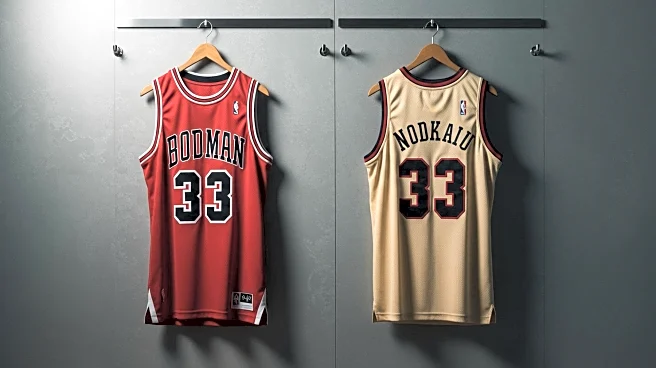What's Happening?
Dennis Rodman, a Hall of Fame NBA player known for his defensive prowess and rebounding skills, recently shared insights into his career during an appearance on N3on's stream. When asked about his biggest rival in the NBA, Rodman took an unconventional approach by naming himself as his greatest adversary. He explained that overcoming personal challenges and self-doubt was crucial to his success in the league. Rodman grew up in poverty without a father figure, which led to difficulties in adulthood, including battles with depression and alcoholism. Despite these challenges, Rodman achieved significant success in the NBA, including winning back-to-back Defensive Player of the Year awards and seven consecutive rebounding titles. He was part of championship teams with the Detroit Pistons and Chicago Bulls, contributing to their victories in the late 1980s and 1990s.
Why It's Important?
Rodman's reflection on his personal struggles highlights the broader issue of mental health and resilience in professional sports. His story underscores the importance of overcoming personal obstacles to achieve success, serving as an inspiration to athletes facing similar challenges. Rodman's career achievements, despite his troubled background, demonstrate the potential for individuals to rise above adversity. His acknowledgment of self as his biggest rival also sheds light on the internal battles athletes face, which can be as significant as external competition. This perspective may influence discussions on mental health support and resources for athletes, emphasizing the need for comprehensive support systems within sports organizations.
What's Next?
Rodman's insights may prompt further conversations about mental health awareness and support in the sports industry. As more athletes share their personal struggles, sports organizations might consider implementing more robust mental health programs to support their players. Additionally, Rodman's story could inspire other athletes to reflect on their own journeys and share their experiences, fostering a culture of openness and support. The NBA and other sports leagues may also explore initiatives to address mental health challenges, potentially leading to policy changes or new programs aimed at supporting athletes' well-being.
Beyond the Headlines
Rodman's story offers a deeper understanding of the complexities faced by athletes beyond their public personas. It highlights the ethical considerations of providing adequate mental health support and the cultural shift towards recognizing the importance of mental well-being in sports. Rodman's narrative may contribute to long-term changes in how athletes are perceived and supported, encouraging a more holistic approach to their development and care. This shift could lead to broader societal changes in how mental health is addressed, both within sports and beyond.









